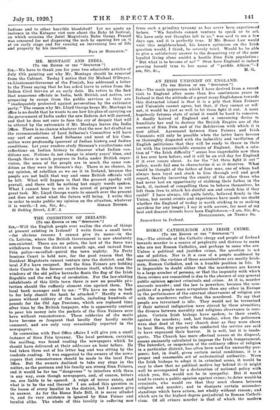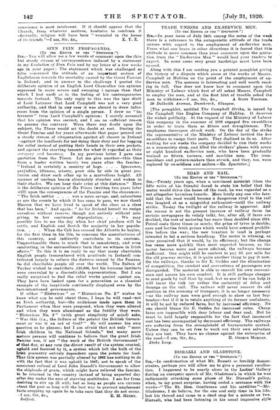ROMAN CATHOLICISM AND IRISH CRIME.
(To THE EDITOR OF THE " SPECTATOR.")
Sia,—The attitude of the Catholic clergy and people of Ireland towards murder is a source of perplexity and distress to mans who are not Roman Catholics, and perhaps to some who are. Unless a political end justifies crime, the question is not one of politics. Nor is it a case of a people maddened by oppression; the victims of these assassinations are mostly Irish- men, Roman Catholics, and in a humble position in life. It is impossible to doubt either that the murderers are known to a large number of persons, or that the impunity with which these crimes are committed is due to the absence of any general public opinion against criminals and crime. At it is, murder succeeds murder; and the law is powerless, because the sym- pathies of a people more scrupulous than any other in Europe in the performance of the external observances of religion are with the murderers rather than the murdered. To say that people are terrorized is idle. They would not be terrorized if their natural indignation were stirred by these atrocities; the divorce between morality and religious observance is com- plete. Certain Irish bishops have spoken, to their credit. against the murders; and, last Sunday, when the policemen were shot dead at the very church door as they were about to hear Mass, the priests who conducted the service are said to have expressed their horror. It is well, but it is inade- quate. The Church has more effectual means at its disposal. means eminently calculated to impress the Irish temperament. The Interdict, or suspension of the ordinary offices of religion in a particular district, has often been used for unworthy pur- poses; but, in itself, given certain social conditions, it is a proper and reasonable act of ecclesiastical authority. Were the Irish bishops to adopt it in criminal areas, it would be easy to show that no political motive lay behind it—it might well be accompanied by a declaration of national policy with which you, Sir, would not be in sympathy. But it would tend to create a public opinion against crime; to deter would-be criminals, who would see that they must choose between religion and murder; and to dissipate certain misunder- standings which have arisen, not wholly without reason; and which are in the highest degree prejudicial to Roman Catholi- cism. Of all crimes murder is that of which the modern
conscience is most intolerant. If it should appear that the Church, from whatever motives, hesitates to condemn it effectually, religion will have been " wounded in the house



































 Previous page
Previous page